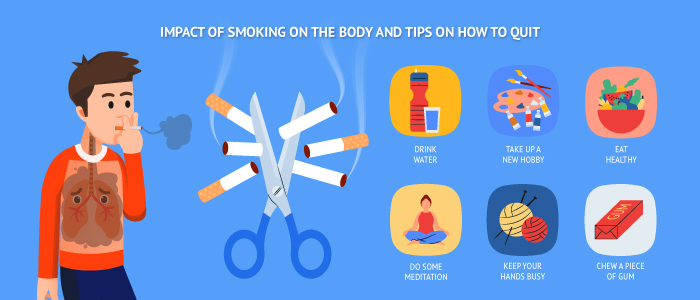Impact Of Smoking On The Body And Tips On How To Quit

Tobacco has been around for centuries, yet we only recently learned about the health impact of smoking. Smokers usually die 10 years sooner than non-smokers. By deciding to stop smoking, you can improve your health and life expectancy.
Experts have known that impact of smoking causes lung cancer and tobacco hurts your health in a variety of ways, including cancer and chronic (long-term) disorders. Smoking-related diseases claim the lives of approximately 480,000 people each year. It also indicated that for every smoker who dies, at least 30 more people suffer from a major smoking-related ailment.
Forms Of Tobacco: Impact of Smoking
Many individuals assume that smoking a cigar is a safer alternative to smoking cigarettes. Cigar smokers, on the other hand, are exposed to many of the same health concerns as cigarette smokers, including cancer. Chewing tobacco or smokeless tobacco is no less dangerous than normal cigarettes. There are nearly 30 new types of cancers that are found in smokeless tobacco.
The electronic vape is a type of cigarette that delivers the nicotine delivery system. These are called traditional tobacco products. In a smokeless inhaled mist, vaping delivers more concentrated nicotine than cigarettes (vapour). If you have asthma or chronic obstructive lung disease, or cancer are among the health hazards associated with vape devices.
Smoking Impact on the Body
Tobacco usage affects all of your body’s organs. Tobacco smoke introduces not only nicotine but also over 5,000 chemicals into your lungs, blood, and organs, including several carcinogens (cancer-causing compounds).
The other serious impact of smoking on health are that it can reduce the potential of life and dramatically affect longevity. Besides, smoking is the leading cause of mortality in the world. Moreover, pregnant moms who smoke can endanger their unborn children.
The following are some of the possible pregnancy side effects-
- Ectopic Pregnancy
- Miscarriages
- Stillbirths
- Birth Defects
- Low Birthweight
Nicotine addiction is a possibility with smokeless tobacco. Chewing tobacco users are at risk for developing mouth, esophageal, and pancreatic cancers. Gum disease, Dental Decay, and tooth loss are all linked to chewing tobacco.
E-cigarettes’ safety and risks are still unknown. Many e-cigarettes have high nicotine content. Vaping is the gateway to other nicotine products. These can be cigarettes or chewing tobacco. There are many harmful compounds found in the vapour of e-cigarettes. You can inhale these vape components which can result in the condition EVALI or fatal lung damage.
Diagnosis
All the diagnostic tests are based on the symptoms you’re going through. For example, a smoker who develops stomach cancer after drinking nicotine-laced juice will require different tests than someone who inhales the smoke.
If you smoke, your healthcare professional will inquire about your tobacco use, evaluate you physically, and occasionally prescribe testing (like an X-ray to check for organ damage or an electrocardiogram and other heart-related tests).
Smoking, in addition to the established cancer dangers, causes a slew of other chronic (long-term) health issues that necessitate continuing treatment. Treatment is required for the following smoking-related problems:
- Increased Blood Pressure and decreased HDL (good) cholesterol (increasing risks for heart attack and stroke).
- Erectile Dysfunction
- Reduced oxygen supply to the heart and other bodily parts (increasing risks for coronary artery disease, peripheral artery disease, and diabetes).
- Routine ailments like the colds, especially in youngsters.
- COPD, Asthma, Bronchitis, and Emphysema are the reasons for poor lung function.
Treatment
A healthcare provider can treat the majority of smoking-related illnesses. The following items may be required-
- To address any damage to your heart, you’ll need to see a Cardiologist.
- To treat breathing disorders such as COPD, you’ll need a lung expert.
- You’ll be treated by an oncology team if you develop cancer.
One of the best ways to avoid such ill impact of smoking is to never start. One should quit it as soon as they start. It can help to reverse health issues. One can do these to avoid smoking-
- Live Longer
- You can decrease the chances of heart attack or stroke.
- Reduce your chances of contracting a number of other illnesses
- Have more energy and feel better
- Improve your appearance and mood
- Improve your olfactory and gustatory abilities
- Make financial savings
Quit Smoking For a Healthy Life
There are numerous methods answering your cliche question of how to quit smoking. One has to select a cessation of skiing strategy to get lucky. And it has to suit your personality. You must be emotionally and mentally prepared. You should want to stop smoking for yourself, not merely for the sake of your family and friends who are exposed to secondhand smoke.
We have a few ideas that can help you in quitting smoking-
- You’ve to get all the cigarettes and lighters along with ashtrays away from home. Anything that makes you smoke should be kept away.
- If you have a roommate who is a smoker, ask them to request not to do so in front of you. You can also make them quit the same.
- Please don’t take your urges seriously. Strike them and have ways to cope with quitting.
- You’ve to keep your hands occupied. Doodle or write something that can keep you away from smoking. You can also read a book or go to the gym for a change.
- Take a big breath when you feel compelled to smoke. Slowly release it after ten seconds. Repeat this process until you no longer have the need to smoke. Meditation can also be used to lower stress levels.
- Avoid smoking-friendly places, persons, and situations. Go places that don’t allow smoking or hang out with nonsmokers (like movies, museums, shops, or libraries).
- Don’t try to replace smoke with food or sugar-based items. These have the potential to make people acquire weight. Choose low-calorie, high-nutrient foods instead. Veggie sticks, sugar-free hard candies, or chewing gum are all good options.
- Limit alcoholic and caffeinated beverages while drinking lots of water. Smoking impulses may be triggered by them.
- Make a belief that you’re not a smoker.
- Remember to exercise because it is good for your health and might help you relax.
These are some ways that can help you with how to stop smoking. Quitting smoking improves your health at any age. Smoking-related harm can be reversed over time. When you’ll quit the smoking, you’ll get many benefits-
- Your blood pressure and pulse rate drop after 20 minutes, while the temperature of your hands and feet rise. You also cease polluting the atmosphere.
- All the carbon monoxide will have low quantities and more oxygen within 8 hours.
- Your risk of a heart attack falls after 24 hours.
- A lack of nicotine will provide a taste and smell after 48 hours.
- Your circulation improves after two to three months, and you can handle more exertion.
- Energy levels will come again and after 1- 9 months you’ll cough less. All the nasal, congestion and breath shortness will also get reduced.
- If you compare them to smokers, your risk of Heart stroke will decrease.
- You will have a decreased chance of stroke after 5 to 15 years of smoking.
- After ten years, your chances of dying from lung cancer are nearly identical to those of a lifetime nonsmoker. The malignancies will be reduced and you can cope with them easily as a result of quitting Smoking.
- After 15 years, your risk of heart disease has finally caught up to that of nonsmokers.
Takeaway?
When you’re ready to quit smoking, there are several ways available to help you. Medical clinics, neighbourhood pharmacies, and support groups are all available to assist you in quitting smoking. When you try to quit smoking, apps and websites provide support and accountability.

